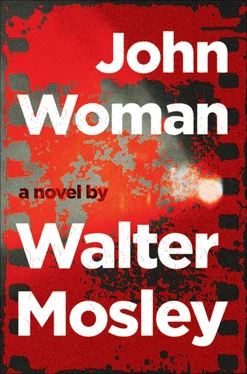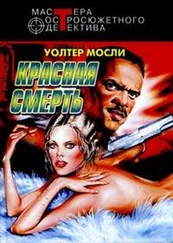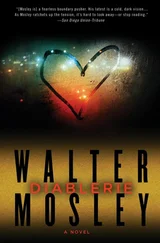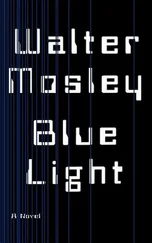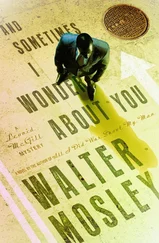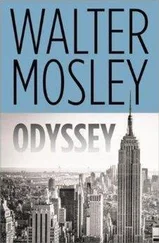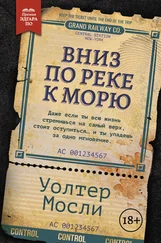John pulled his hand away but Lucia did not fade.
“Can you forgive me?” she pleaded.
“If I ever said the slightest thing wrong you’d kick me out the house,” he said. “I never wanted dad to know so I slept on the floor of the projection room.”
“I was wrong. Your father and you were the best things that ever happened to me but my heart had a mind of its own. Red wine and bad men were my downfall.”
After long minutes of silence he said, “I can probably get us double-decker apartments and we could live together for a while.”
“All right, CC, whatever you say.”
“Will your husband get angry at you for not coming home?”
“Filo understands me, baby. He wants me to be happy.”
The next couple of months were nearly idyllic for young Dr. John Woman. With the help of President Luckfeld and Dean James he and his mother moved into a full family unit in faculty housing. He occupied the top apartment.
Carlinda stopped coming by. He saw her in class but she avoided eye contact and spoke to him only to ask questions about his lectures. Her papers were excellent. She had come up with a powerful theory about the interplay between dialectics, technology and the interpretation of historical events. It was her notion that the present was always struggling with the past because of technology’s impact on understanding. People in the now see the past through an ever-changing, never-repeating kaleidoscope of technological experience, she wrote. How can we hope to understand what went before, even in our own nation and language group, if the ability to perceive and empathize has been altered through technology and its attendant technique?
Attached to one of these papers was a handwritten note which read:
John
I have reconciled with Arnold. The fever is over. It’s better this way.
C
The words rang true.
He had stopped going to see Senta. His sexual drive, he came to believe, had been in response to loneliness and isolation. Now that he had coffee with his mother every morning he no longer felt alone.
In the evenings Lucia, whose new name was Rosa Pitkin, made dinner for John and sometimes guests from the school administration and history department.
President Luckfeld and his Panamanian wife, Marte, ate with them four times in as many weeks.
“You are very lucky to have your mother in your life,” blue-eyed tawny-skinned Marte said one evening when Lucia had made lasagna filled with linguica and shiitake mushrooms. “Most Americans, I find, run away from their blood and then wonder why they’re unhappy.”
“He’s a perfect son,” Lucia agreed. “I don’t deserve him.”
John found that he spoke less and concentrated even more on his deconstructions of the interpretations of what went before.
The history department vacated his ouster then voted him department chair when Annette Eubanks suddenly decided to step down. Ira Carmody was his opponent receiving only three votes.
On the evening after John was elected chair he took his mother to a restaurant called the Country Road Diner located on the outskirts of Parsonsville. It was an old place patronized mainly by old-time locals. John liked to think that the Brother of George ate there, that maybe they had sat side by side at the counter now and then.
That evening John and his mom sat in a corner booth served by Esther Simmons, whose mother’s family had lived in the county for six generations; her father’s people had been there even longer.
John ordered chicken-fried steak while his mother had country beef stew cooked in a red wine sauce. Lucia wore a thick silver necklace and rose gold earrings studded with miner’s diamonds.
“My son the college man,” Lucia said raising her third goblet of wine. “Here I barely made it out of high school, your father never saw the inside of a classroom and you are the boss of a department... you could be university president one day.”
“Yeah,” he intoned, “I’m a real success story.”
Ordering her fourth glass of wine she touched the baby finger of her son’s left hand.
“You don’t think I get the news from home, CC?”
He noticed the concern in her face.
“I read about the old silent theater and the body and who they’re looking for,” she said.
“So you think I did it?”
“I know it.”
“How?”
“Because you were the bravest man I ever knew when you were no more than ten. Because most men need to be stronger or better armed to feel brave but you had your father’s courage.”
“The bravery that women have in a world dominated by men,” John said.
“Just like that,” Lucia agreed, slurring her words slightly. “But better because you wouldn’t hide behind anybody. And if that Chapman Lorraine came in the projection room and found you, you wouldn’t have no choice but to kill him; either that or have you and your father throw’d out on the street. I know that as sure I’m breathing.”
“You...” John said. “You actually see me sitting here in front of you?”
“You’re my son, my blood.”
John felt her claim on him. This drunken passion somehow daunted his intelligence.
“My entire life I missed you, mom.”
“I only left New York when you were sixteen, baby.”
“But even before then you’d be gone in the morning and dad would be so sad that I couldn’t make him smile.”
“I’m a terrible human being.”
“And still I love you more than anything.”
“I’m going away for a few days,” Lucia told her son seven weeks, three days and thirteen hours after she’d miraculously reappeared in his life. “I need to go see Filo.”
“Why doesn’t he come here?” John asked, trying to push down the panic in his chest.
“It’s that if the FBI is watching thing,” Lucia replied. She was dicing onions in his third-floor kitchen.
“How long will you be gone?”
“Three days.”
“Could I come?”
“You have that president’s lecture.”
“Oh... right.”
“But Filo would like to meet you one day,” she said. “He’s a very busy man too.”
“Busy doing what? I thought he’d retired from being a crook.”
“He did... he has. Now he works for charities and public groups.”
“Isn’t that dangerous?” John asked wanting to keep the conversation going.
“I told you that he’s had plastic surgery and his name was changed. As long as he’s no place anybody is looking for him it’s okay.”
“What is his new name?”
Lucia looked at her son a moment, her eyes filled with tears from the pungent onion.
“I better let him tell you that,” she said. “You know just a name could put him away for life, maybe get us both killed.”
“Oh... okay. I’d really like it if you stayed until after the lecture, mom. Then we could go together.”
“Next time.”
Heartbreak was a familiar feeling, even older than the guilt over the death of Chapman Lorraine. He remembered clearly when his father was in the hospital and his mother sent him away.
“It’s okay, honey,” Lucia cooed. “I’m never leaving you again.”
“Except to go see Filo.”
“Only for a few days.”
“When are you leaving?”
“Tomorrow morning.”
The next afternoon was the first time he considered calling Carlinda. The apartment felt empty. He could say that he wanted to discuss Carlinda’s paper. Instead he turned to the lecture he was supposed to give the next day — History: The Art of Living with Death. Pencil in hand he sat before a stack of blank paper. He promised himself that if he didn’t write anything by seven he’d call Carlinda.
Читать дальше
